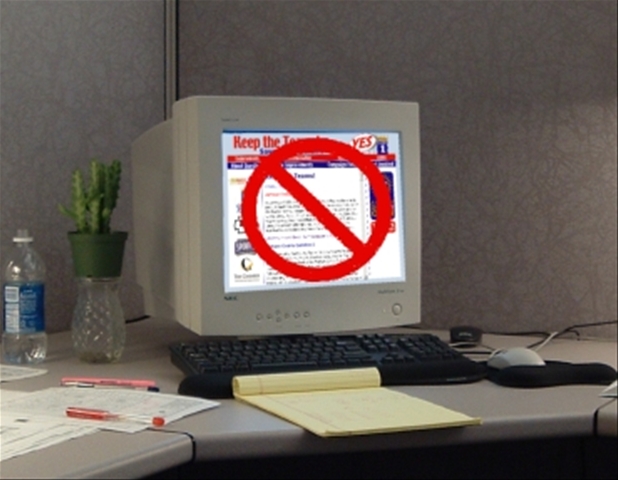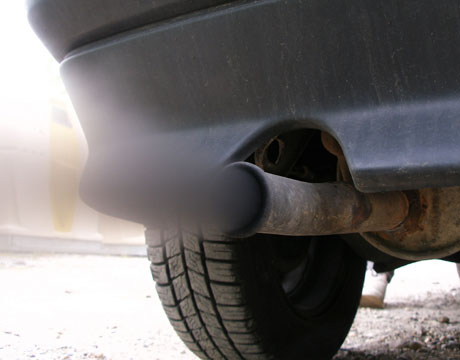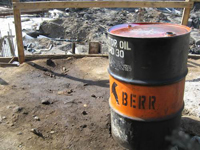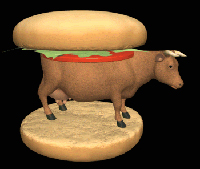


Frequently asked questions (FAQs) about living lightly on the planet
Is it better to leave my computer running during lunch hour and at breaks when I'm not using it? BELIEVE IT OR NOT, some people leave their computers running day and night, believing that starting them up uses more energy and causes more wear and tear on the equipment. Not so, say some experts. While this isn't an exact science, a general rule of thumb is if you're not going to need the computer for more than an hour, you need to turn it off. This may seem like a small energy saving, but it has been claimed that if everyone did this, (along with putting other electronic equipment on power strips to eliminate "phantom" loads) we could shut down entire coal-burning power plants!
When I'm doing errands around town in my car, is it okay to leave the engine running rather than turn it off for a few minutes at each stop? EXTENDED IDLING generally isn't good for an engine, and it greatly increases emissions. (Besides, a large percentage of car thefts involve keys left in the ignition!) One rule of thumb is to turn off the engine if the vehicle is going to be stopped for more than three minutes. It helps if you're not in the habit of using drive-up service windows!
Does it make a big difference whether I turn off the water tap while I'm brushing my teeth? SUCH A RITUAL could make more of a difference if it encouraged you to think about the preciousness or sacredness of water and how the lack of adequate fresh water is a growing problem all over the planet. But if you want to focus on the big picture while you're brushing, consider the staggering quantities of water required to produce a lot of your food (like meat and some grains), as well as many other consumer products (like cotton and computer chips).
What's this "peak oil" I keep hearing about? OIL FIELDS by their very nature have limited productive lives. After removing the oil that is easiest to extract and refine, oil companies are forced to expend more and more resources, including fuel, to deliver a given quantity of product. This is commonly known as the "law of diminishing returns." Eventually the point is reached when net yield begins to permanently fall off, no matter how much effort is devoted to production. Many of the major oil fields around the world are already in decline. Petroleum production for the U.S. peaked in 1970. Oil industry expects global production to peak soon (if it hasn't already). Yet world demand for oil continues to grow—a recipe for sharply increasing oil prices for the foreseeable future, and a potentially fatal blow to any growth-based economy for which cheap, abundant oil has become its primary resource. To put it bluntly, the world as we know it is about to change drastically due to peak oil, and our leaders, particularly in the U.S., have done little or nothing to prepare for this. It seems like everything in the supermarket comes in non-recyclable plastic packaging. What's a person to do? SHOP AROUND for different stores. Many local food co-ops sell certain items in bulk. Bring your own containers. While you're there, enjoy the smells of fresh, whole foods that aren't mummified in plastic or dosed with artificial scents. Tell store managers when you're pleased or not pleased with packaging options. Are biofuels (ethanol, vegetable oils, etc.) an answer to fossil fuel dependence? UNFORTUNATELY there has been a great deal of media and industry hype about biofuels. They have a role to play. But it has been noted by more objective sources that more energy goes into raising the grains than can be obtained from the biofuels are distilled from those grains. It is also reported that farms in the Midwest typically lose three bushels of topsoil for every one bushel of corn they produce! In other words, energy based on biofuels can't be sustainable if the agriculture it's based on isn't sustainable. Furthermore, we must acknowledge the immense scale of current fossil-fuel use that would need to be replaced in a "business-as-usual" scenario. The energy equivalent in biofuels would take over most of the country's cropland, at a time when much of the world is haunted by food shortages. A recent report on indirect effects of biofuel production on biodiversity is quite disturbing: Increased demand for ethanol for American cars has driven up market prices for corn. This has prompted more North American farmers to switch from growing soybeans to growing corn. Because there has been no drop in world demand for soybeans, farmers in Brazil have taken up some of the slack by clearing more Amazon rainforest to grow soybeans.
Will we all be driving hydrogen-powered cars in the future? MORE MEDIA AND INDUSTRY HYPE, bordering on misrepresentation. Hydrogen fuel can only be produced by extracting it from hydrogen-containing chemical compounds (such as water and coal). This requires more energy input than the resulting hydrogen product contains. There are daunting problems in creating a large-scale transportatiton system around a substance that is notoriously hard to store and handle safely. There is also reportedly no realistic prospect for building enough hydrogen cars and matching distribution infrastructure to replace the existing system. If trains are so energy-efficient, why are plane and bus tickets often much more affordable? AIRLINES AND HIGHWAYS get various kinds of special legislative and regulatory consideration, while passenger rail has become a transportation stepchild. This doesn't excuse Amtrak's poor management, but the industry's prospects will continue to dim while ideologically motivated budget battles are waged with biased accounting systems and terminology. (For example, funding for rail passenger service is called "subsidies" while similar support for air and highway travel is called "investing in infrastructure." Bite the bullet and book your next trip on Amtrak—You may not get another chance!
Is world population a problem? TWO FACTORS are said to be responsible for the six-fold increase in world population over the the last 200 years. One is improved public health. The other is the availability of relatively cheap, abundant fossil fuels, which until now has enabled a dramatically increased food supply. Post-petroleum-peak energy shortfalls, as described above, will pose a severe challenge to feeding the world. But the number of people that the planet can support depends largely on consumption levels. Some experts claim that without cheap energy the world could support the present 6.55 billion people only at the subsistence level of many Third-World countries, but it could not support more than a billion or two souls at the current level of consumption of North Americans! The implications, socially and ecologically, are very sobering. Again, world leaders, particularly those in the U.S., have pursued a heads-in-the-sand policy, with the result that global problems of every kind are being exacerbated by unacknowledged population/consumption pressues. I've heard climate research groups say the jury's still out on whether global climate is human-caused and whether there's still time to do anything about it. THE "RESEARCH INSTITUTES" that are still pushing this discredited notion are funded by the fossil-fuel industry and other vested interests. It has been known for centuries that CO2 acts like the glazing on a greenhouse, trapping heat in the atmosphere. The level of CO2 has jumped in the last 50 years to the highest level it has been in over 100,000 years—when average world temperatures were significantly higher. Since the atmosphere is just a thin vapor veil, there isn't much room for absorbing the rapid release of carbon that has accumulated in the earth's crust over millions of years. It's true that climate patterns swing through long natural cycles. But the weather aberrations noted in the last 15 years are well outside the probable range of such variations. The overwhelming majority of the world's atmospheric scientists now believe that the debate is over, that the world has entered an extended period of potentially catastrophic climate disruptions. Average temperatures will continue rising for decades to come even if we stop all CO2 emissions today. But one thing is clear: The effect on future generations will be more severe if we don't begin making signficant changes now.
Is nuclear power an answer to global warming? ADVOCATES CLAIM that nuclear power plants don't emit carbon dioxide and other greenhouse gases. But in fact the construction (and eventual decommissioning) of the plants, as well as the mining, enrichment, transportation, and disposal of nuclear fuel, require huge amounts of fossil fuels, which must be figured into any calculation of net energy produced. As higher-grade ores are used up, ores with lower percentages of uranium have to undergo more energy-intensive enrichment to reach fissionable concentrations. The enrichment process, which is powered by coal-fired electricity plants, therefore will release even more greenhouse gases and pollution. Further, the proven world's uranium reserves are limited, and are projected to last another 60 or 70 years. If the number of nuclear plants is significantly increased, the reserves will be exhausted even sooner. Even reluctant nuclear advocates point out, correctly, that growing demand for electricity, especially in developing countries, is likely to result in dramatic increases in coal burning (CO2 emissions) in the coming decades if alternatives aren't provided. But the potential for conservation (efficiency and curbing waste) as well as "soft path" renewable sources is often underestimated. Nuclear power is just a fancy method for boiling water to drive the steam turbines that generate electricity. However, many energy needs are not appropriately or effectively met with electricity. For example, using high-temperature electricity for low-temperature space heating has been described as "the thermodynamic equivalent of using a chain saw to cut butter." Passive solar is a better match. Considerable subsidies—including legislated caps on industry liability—further mask the true cost of nuclear power. Security, safety, and centralization-of-control issues raise serious questions about the long-term acceptability of this technology. What is commonly overlooked is the fact that a comparable amount of money invested in energy conservation could lead to a greater reduction in greenhouse gas emissions.
Can I be an environmentalist and still eat meat? THE ISSUE OF DIET AND ENVIRONMENT is too complex to be dealt with in terms of a simple either-or proposition. Some relevant "food for thought" can be found in the QEW pamphlet Healthy Food, Healthy Planet. Sincere "friends of the earth" should also be mindful of the following:
(Source: People For The Ethical Treatment Of Animals: http://www.Goveg.Com) However, others point out that much commerical food in the non-meat category is produced unsustainably, so going vegetarian doesn't necessarily get us off the hook. And some hilly and semi-arid terrains are environmentally better suited to grazing animals than for grain crops. Permaculture design principles have a place for humanely treated livestock. If you do need or choose to eat meat, there are lower-impact options, such as free-range, grass-fed livestock raised humanely without preventive-use antibiotics or hormones. And by learning how to prepare more nutritious and tasty non-meat dishes, you can reduce your total consumption of meat. One person doesn't seem to make much difference in the bigger scheme of things. Why should I go to the trouble and expense of adopting an Earth-friendlier lifestyle if the rest of the world seems bent on self-destruction? WE NEED TO BE ASKING different questions—ones that aren't inherently self-defeating. Doing the right thing shouldn't depend on what others do or think. Jesus had a lot to say about this: "Treat others the way you want to be treated, light a candle rather than curse the darkness, the meek shall inherit the earth," etc. Yes, you're only one person. But if you cower in the face of adversity and uncertainty, you're not even that. On the other hand, you can multiply your powers when you pass your light along to others and inspire them to action. If you write ten letters, or attend ten meetings, you're having the influence of many uninvolved citizens. Remember the parable of the mustard seed: It's surprising how fast a movement can grow when it's led by the power of the Spirit. As Margaret Mead put it, "Never doubt the ability of a small, dedicated group to bring about significant change in the world. Indeed, it is the only thing that ever has." |
|---|









